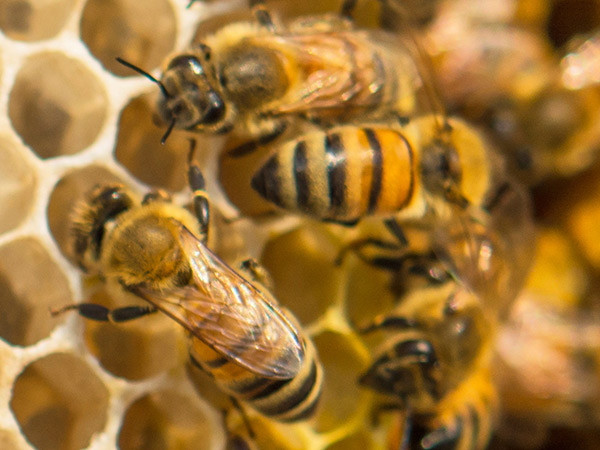Der Einsatz von Pestiziden in der Landwirtschaft und dessen Auswirkungen auf die Honigbiene sind seit Jahren ein umstrittenes Thema in Politik und Forschung. ZoologInnen der Karl-Franzens-Universität Graz haben nun herausgefunden, dass auch nicht-tödliche Dosen von Pflanzenschutzmitteln fatale Folgen für mit Amerikanische Faulbrut infizierte Larven haben. Die Ergebnisse wurden dieser Tage im Fachmagazin Scientific Reports publiziert.
Wie wirken Pestizide auf den Organismus von Bienen, die mit Krankheiten infiziert sind? Dieser Frage gingen Dr. Wolfgang Schühly und Dr. Javier Hernández López mit ihrem Team am Institut für Zoologie der Uni Graz nach, um zu verstehen, welchen gesundheitlichen Risiken die bestäubenden Insekten ausgesetzt sind. „Wir konnten erstmalig für zwei Pflanzenschutzmittel zeigen, dass sie auf Larven jeweils einen stärkeren negativen Effekt haben, wenn diese den Erreger der Amerikanischen Faulbrut in sich tragen“, fasst Schühly die Ergebnisse der interdisziplinären Arbeitsgruppe für Bienengesundheit zusammen. Die Kombination der beiden Belastungen schwächte die Immunantwort der Larven deutlich und erhöhte ihre Sterblichkeit signifikant, und zwar jeweils ausgeprägter als die Summe der Einzeleffekte erwarten ließ. „Das heißt also, dass das Zusammenspiel mehrere Stressoren unerwartete Folgen nach sich ziehen kann und die bisherigen Einschätzungen der Pestizidwirkung oft zu kurz greifen“, präzisiert Schühly. Für viele infizierte Larven sind als unschädlich eingestufte Mengen bereits tödlich.
„Das ist allerdings erst ein Zusammenhang, den wir zeigen konnten. Es gibt mit Sicherheit wesentlich mehr Interaktionen zwischen Pestiziden und Krankheitserregern, die es noch zu erforschen gilt“, erklärt der Zoologe. Über die letzten Jahrzehnte haben zahlreiche Untersuchungen den Rückgang der Bienenpopulation belegt. Verantwortlich dafür sind mehrere Faktoren, etwa die Ausbreitung von Parasiten – wie der Varroa-Milbe – und von Viren, der Einsatz von Pflanzenschutzmitteln sowie fehlende natürliche Lebensräume und damit der eingeschränkte Zugang zu vielfältigen Nahrungsquellen.
Die Forschungen der Grazer ZoologInnen sind Teils des groß angelegten österreichischen Projekts „Zukunft Biene“, das Univ.-Prof. i.R. Dr. Karl Crailsheim leitet.
Publikation:
Javier Hernández López, Sophie Krainer, Antonia Engert, Wolfgang Schühly, Ulrike Riessberger-Gallé, Karl Crailsheim, „Sublethal pesticide doses negatively affect survival and the cellular responses in American foulbrood-infected honeybee larvae“, Scientific Reports
Infos zum Projekt Zukunft Biene:
www.zukunft-biene.at
